- Home
- Carl Deuker
Payback Time Page 5
Payback Time Read online
Page 5
The tournament dragged. I was lonely, and the excited cheers around me made me lonelier. I ate more than I should have—a hot dog, fries, and Coke at noon. Another combo at three thirty. A little before six o'clock, when the team had a ninety-minute break, Kimi walked out with Marianne, Rachel, and Erica Stricker. So much for eating dinner with her.
I slipped my laptop into its case and headed out. People might let me down, but food I could count on. Three blocks from the SunDome is a Mexican restaurant, Santiago's. A menu was taped to the window: enchiladas, tamales, chili con queso, fish tacos, flan, fried ice cream. I started to push the door open—and then changed my mind.
I walked up Yakima Avenue until the stores drifted away, turned, and came back on the other side of the street. There was nothing to see, but after all those hours in a hot gym, it felt good to move.
I stopped at a mom-and-pop grocery store and bought a peach yogurt, an apple, and a roll, all of which I ate while sitting on a bench in a tiny park on a side street. The yogurt was warm, the apple mushy, and the roll stale, but I felt good about my meal.
I returned to the SunDome for the trophy round of the tournament. Early in the day when the Lincoln girls had been playing inferior opponents, they'd dominated. Terri Calvo, Loaloa Toloto, and Chelsea Braker were good. If a decent set came to any one of those three, she'd pound the ball down, making a kill. But against the better teams, Lincoln's flaws became glaring.
If a bump went wild or a set wasn't right, Chelsea, Loaloa, and Terri would look at one another, roll their eyes, and shake their heads. The other girls—Erica, Marianne, and Rachel—would glare right back. An earthquake fault ran right through the team. With a big lead, they were awesome. But in close games decided by a few rallies at the end—those they lost.
The real story would have been about the rift in the team, but no school newspaper prints negative stories about high school players. I slogged away on the preview article, pumping up their prospects, depressed because I knew what I was writing was neither true nor interesting. This kind of story wasn't why I ached to be a journalist.
Finally the awards were passed out—the Lincoln girls got ribbons for taking seventh—and the tournament was over. I expected nothing from Kimi on the ride back, and that's what I got. She scrunched down in her seat, wedged her backpack between her head and the window as if it were a pillow, leaned against it, and closed her eyes. Within ten minutes she was asleep. Thirty miles from Ellensburg, I called my mom, told her I was going to be really late, and then drove and drove.
When we exited the freeway, the change in speed woke Kimi. "Oh my God," she said. "What time is it?"
"Two," I answered.
She opened her cell phone and punched in a number. A second later she started talking. I couldn't understand a word, but I could figure out what she was saying. And I could figure out her father's angry replies, too.
From the freeway exit to her house takes about fifteen minutes. As soon as I pulled into her driveway, she swung the door open, jumped out of the car, and ran to the front door. It opened before she reached it.
I pulled the car door closed behind her. "You're welcome," I said to the empty seat, and I drove off.
4
THE NEXT MORNING, when I checked my e-mail, I saw that Kimi had sent me a dozen photos she'd taken at the tournament. I didn't bother to look. What did I care about her or her photos? I went down to the Locks and jogged over to Magnolia. But after my shower, I returned to her e-mail and opened the attachments, one by one.
All the photos were good, and one was flat-out great. She'd caught Erica Stricker, eyes closed, mouth tight, arms extended up and over the net, blocking a spike. It was exactly the type of photo the Seattle Times runs at the top of its prep sports page.
I stared at the photo on my computer screen. Kimi had treated me like a taxi driver. What did I owe her? Nothing. But I called her anyway.
"You really think the Times might use it?" she said, excited. "I wasn't sure if any were good enough for the Lincoln Light."
"For sure Alyssa will use them, but it can't hurt to try the Times."
"Should I e-mail it to them?"
My dad never used the phone if he was after a new client. "They need to see you, Dan. That's the way of the world. Remember that."
"No, Kimi. You should bring the photo to them yourself."
The line was quiet. "Will you go with me?"
Now it was my turn to let seconds silently tick away. I wanted to say that I had other things to do, but I didn't have to work until later, and I wanted to be with her more than I wanted to save my pride. "If you want."
Chet Jetton, known as Chet the Jet, is the high school sports editor at the Seattle Times. I thought we might have trouble getting to see him, but once the receptionist looked at Kimi's photo, she pointed us down a narrow aisle. "Turn right at the plastic tree. Chet's cubicle is the second one on the left. I'll buzz and tell him you're on your way."
Chet is fiftyish with a gray goatee. He was wearing a UW cap, a beat-up gray sweatshirt, and baggy jeans. He had his feet propped up on his desk and was leaning back in his chair, a pencil behind his ear, reading glasses down on his nose. He stood when he saw Kimi and introduced himself.
"So, Kimi, let me see your photo." Not once did he look at me, something that always seemed to happen when I was with Kimi.
Kimi handed it over. He scratched his chin. "We might be able to use it. We'll pay fifty dollars if we do. No guarantees, though."
"She needs to know now," I said, amazed by the firmness in my voice. "Otherwise we'll run it in the school newspaper."
Chet cocked his head and peered at me. "You her agent?"
"I'm the sports writer for the Lincoln Mustangs. I'll be sending you the game reports."
"You're my stringer?"
I nodded. "Mitch True," I said, sticking out my hand.
We shook. "Glad to meet you, Mitch." Then he turned back to Kimi's photo, tapping it with his finger. "We'll buy it," he said at last. "Ask the secretary for the forms for freelancers. Fill them out, mail them back, and you'll get your check for fifty dollars in a few weeks. You get a freelance form too, Mitch."
"Will she get photo credit?" I asked. "Of course she will," Chet snapped. "This is a professional newspaper. Nobody here will ever cheat you."
5
AS WE RETURNED TO THE FOCUS, Kimi's eyes were shining. "The Seattle Times took my photograph," she said over and over. "I can't believe it."
"It was a great photo."
She leaned over and kissed me on the cheek. "Thank you, Mitch. This wouldn't have happened without you."
It was a kiss she might give a brother, but it was a kiss. I tried not to turn red, which only made me turn redder. The anger I'd felt about the Yakima trip—it was gone. I started up the car and roared—if a Focus can roar—out of the parking lot. "Let's go to Peet's," I said. "My treat."
"I found out more about Angel," I said once we were seated upstairs looking out over Fremont Avenue. I was glad she'd picked the counter and not a table. I liked being near her, but sitting face-to-face made it harder for me to talk.
I described how I'd stumbled upon Angel's house and how I'd seen him throwing the football with his friend. "Then a car came up the block, moving fast. Angel hid while his friend stared down the car. I'm not completely sure about this, Kimi, but I think his friend pulled out a gun."
"You're joking."
"I know it sounds crazy, but I'm almost positive."
"When did this happen?"
"A few days ago."
"Why didn't you tell me sooner?" Her voice was miffed.
I shrugged. "I don't know. I guess I was waiting for a time when we could talk."
She stirred her latte for a moment, and then leaned toward me. "Actually, it fits with something I've been thinking," she said, her anger gone. "In fact, it fits perfectly."
A gun didn't fit with anything I'd been thinking. "Tell me."
"A few years ago, two cops
went undercover at Federal Way High School. In February, they busted a dozen students for drugs, including three brothers who were running a meth lab in a shed behind their lawyer parents' fancy house, and a doctor's son who was selling stolen prescription pills. Lincoln has its share of druggies. They're buying meth and other stuff, which means somebody is selling. If the police department sent undercover agents into Federal Way High, they could do it at Lincoln High. I think Angel is a cop."
"A cop?"
"A cop."
The more I thought about it, the more possible it seemed. Kimi's theory explained why Angel looked so old, why his friend would have a gun. And Lincoln did have its share of drug users. Laurie Walloch and her friends for sure, and other kids I didn't know by name. A whole bunch of them had spooky eyes and looked wired twenty-four hours every day. But would the police bother with twenty or thirty kids?
"I can sort of see it," I said. "Only why would an undercover drug cop try out for the football team? Druggies aren't football players."
Kimi chewed on a fingernail for a bit. "Say I'm right and he's an undercover cop. What does he do? Show up the first day of school at Lincoln looking old and with no friends? How would he ever get in with anybody? But if he plays on the football team, when he shows up the first day, he's connected. The cops in Federal Way joined the yearbook staff. That gave them an excuse to go all through the school. Being a football player is like having a pass—football players can do what they want at school. Think about this, too. If Angel is an undercover cop, he'd want to be on the team, but he wouldn't want to be the star. That would attract too much attention. When he was throwing the football around with his friend, he didn't know we were watching, so he let his ability show. In front of McNulty, he pretends to be middling. It all fits with him being undercover, with staying under the radar."
She pursed her lips. "Mitch, if I'm right, if Angel is a cop, this could be a huge break for both of us. As he does his drug investigation, we investigate him. I get pictures; you write up how he gains the trust of the drug users. When the arrests come, we'll scoop everyone. The Seattle Times will run our story: 'Inside the Drug Bust at Lincoln High.' Both of our names will be on the front page. Think how much that would help our college applications."
6
I HELPED WITH MY PARENTS' afternoon deliveries, came home, ate dinner, and figured the day was done. Then, around eight thirty, my cell phone rang. Kimi was on the line. "You said you know where Angel lives. Let's go take some pictures."
"Now?"
"Why not?"
"What if he sees us? And what if it really was a gun?"
"You can park down the block. I'll use a telephoto lens; he won't notice anything. Anyway, cops don't shoot people for sitting in a car."
Five minutes later, I pulled up in front of Kimi's house. She hurried down her walkway, wearing shorts and a pink top, camera bag slung over her shoulder, her father at the door watching.
I drove across the Ballard Bridge, wound past Fishermen's Terminal, and made a right onto Commodore Way. I turned left on Elmore Street, drove one hundred feet up the block, pulled to the curb, and stopped. I flicked off the headlights but kept the engine idling. "There," I said, pointing up the block and across the street. "The one with the bars on the windows."
Kimi started snapping pictures of the ramshackle house.
"Isn't it too dark?" I asked.
"The twilight will give the photos a mysterious look. I can use Photoshop to brighten the images if I need to."
With every click of the camera, the whole undertaking felt increasingly dangerous, but Kimi kept snapping away. At last she put the lens cap on the camera and stuck the camera back into its case. I was about to speed off when she leaned forward, her brow furrowed, and nodded toward the house. "Wait. Do you notice something odd about the iron bars on the windows and doors?"
I looked. "Not really."
"The paint is peeling; the porch looks like it could crumble away, but the bars are brand new. And see how fancy they are? My dad recently had security bars put over the windows on our house. Wrought iron like that costs money." She turned to me. "I bet there's a top-notch security system in place."
"And all that means?"
"The ramshackle house is a cover. If you look quickly, it seems like one thing; look harder, and it's something else. The same with Angel."
That moment the front door opened and the older guy, wearing his Seahawks sweatshirt, stepped onto the porch. He looked down the block opposite from us, and then he turned and stared at the Focus. "Get down," I ordered, and we both slunk down in the seat.
For a long moment, we stayed down. Then a new dread came over me. The Focus's engine was running. Had the guy heard it? What if he was walking toward the car right at this moment? What if he had a gun in his hand?
I inched my head up until I was able to see. The guy was coming toward us, and fast. I didn't wait to see what he wanted. I threw the Focus into drive and peeled out of there. "Stay down!" I barked at Kimi. As I tore past the guy, I put my hand up by the side of my face so he couldn't see me. At the end of the block I made a hard left and then raced through the side streets of lower Magnolia until I reached Dravus Street, which I followed down to Elliott Avenue. Neither Kimi nor I said a word until I pulled up in front of her house and killed the engine.
"My heart is pounding so hard I can hear it," she said.
"Mine, too."
I looked at her, and for no reason we both started to laugh.
Her porch light flicked on. "I better get inside," she said, the laughter subsiding as quickly as it had come, and she was out the door and up the walkway.
I headed toward my home, but turned north on Thirty-second and drove up to Sunset Hill Park instead. I parked, walked to the chain-link fence, and looked out over Puget Sound. Two ferries glided on the water, their lights twinkling in the black.
I tried to make sense of what had happened. I'd completely panicked, that I knew for sure. But everything else was murky. Had the guy really been coming toward us? Or was he just going for a walk?
I stared at Puget Sound for a while, my mind rolling like the waves, and then drove home. All night I kept waking up, then falling back asleep. I'd finally fallen into a deep sleep when my cell phone rang. It was eight in the morning, and it was summer, yet Alyssa was wide awake. "How are your football stories going?" she asked. "I'd like two, you know. A preview, and then a story about the game against Mater Dei on Saturday. Oh, and a volleyball preview, too."
"I'll have them all by next week," I said, my mind foggy.
"If you did the previews early, we could get the pages ready for publication. I want to have the September issue out as soon as possible, maybe even the first day."
"I'll get it to you as soon as I can, Alyssa."
The volleyball preview was done, but the football preview was causing me nothing but trouble. For a solid hour I worked on it. I must have tried fifteen different hooks, but none worked. I'd write a few paragraphs only to have my ideas dwindle away. The whole time I was wasting my effort on those useless paragraphs, I could feel an imp sitting on my shoulder. "Horst! Horst!" the rascal kept whispering in my ear. "Write about Horst!" Finally I gave in, and once I focused on Horst, the article wrote itself.
7
THE HIGH SCHOOL FOOTBALL SEASON in Seattle opens every year with the Seattle Challenge. Powerhouse teams from California fly up to square off against the best Puget Sound teams at Qwest Field, the Seahawks stadium. Because of Horst's growing reputation, Lincoln High had been invited, and we were matched against Mater Dei, a football factory from Southern California.
The morning of the game, my mom stopped me as I headed out the door for my run/walk. "You look slimmer, Dan." I grimaced, because I hate it when anyone says anything about my body, but she persisted. "Really, there's a change."
"You look taller, too," my dad called out. "I told you you'd grow."
I drove to the Locks, but before starting my run, I looked at my
face in the rearview mirror. Were they right? Or did I still look like Wilbur from Charlotte's Web, which is how Heather Lowry had described me in eighth grade. I could still picture her: blond, curly-haired, with her wicked smile.
I stepped out of the car, not sure that my face looked thinner, not sure that my legs were longer, but hopeful. Then I went for my run. Each day I was running more and walking less; I could actually imagine a day when I'd run the whole way.
When I finished, I returned home and showered. I was done working—school was starting soon, and my parents gave me the last week of summer off—but having nothing to do made me restless. I cleaned my closet and straightened up my desk. At three I called Kimi and asked if she needed a ride, but she was going with Marianne and Rachel, which is what I'd expected.
Kickoff was at seven thirty, so I left at six thirty. As I drove, I kept changing channels on the radio. I was glad I didn't have any junk food in the car, because when I'm nervous, I eat. A mile from the stadium I panicked, certain I'd left my press pass at home on the kitchen table. I pulled my wallet out and rifled through it, my eyes darting back and forth from the road to the contents until I discovered the pass behind my driver's license.
I found a parking spot four blocks south of the stadium. I showed my pass at the press gate, and the usher waved me through. As I shoved the pass back into my wallet, I spotted Chet the Jet and my shoulders slumped. "Don't look so happy to see me," he said, smiling wryly. "And relax. This will be my only Lincoln game. You'll get plenty of chances to be my stringer."
I managed a weak smile. "I don't mind that you're here."
He shook his head. "We both know the score. Since I'm here, you get no byline. It's good to be greedy for a byline—greed is a quality every top-notch reporter has in abundance. And I'm sure there's room for fifty bucks in your wallet."

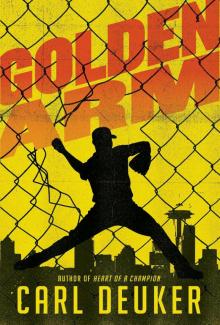 Golden Arm
Golden Arm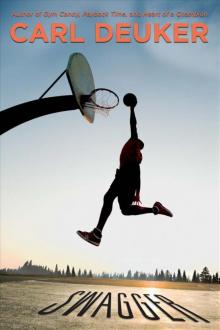 Swagger
Swagger Gym Candy
Gym Candy Night Hoops
Night Hoops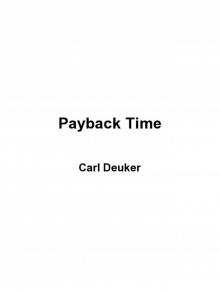 Payback Time
Payback Time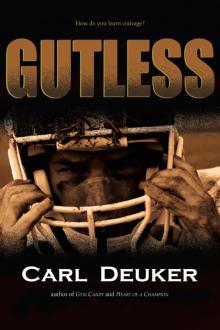 Gutless
Gutless Runner
Runner High Heat
High Heat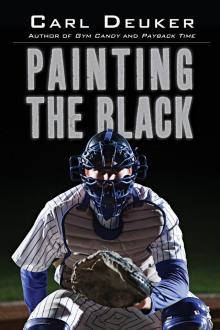 Painting the Black
Painting the Black